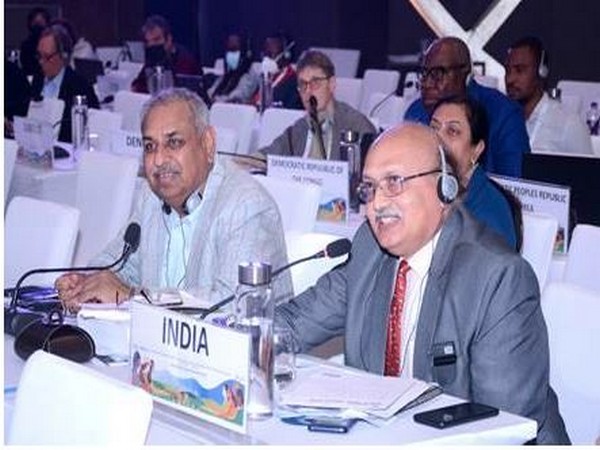Governing body session of International Treaty on Plant Genetic Resources concludes in New Delhi
The Ninth Session of the Governing Body (GB9) of the International Treaty on Plant Genetic Resources for Food and Agriculture (ITPGRFA) concluded in New Delhi on Saturday, said the Ministry of Agriculture and Farmers Welfare.

- Country:
- India
The Ninth Session of the Governing Body (GB9) of the International Treaty on Plant Genetic Resources for Food and Agriculture (ITPGRFA) concluded in New Delhi on Saturday, said the Ministry of Agriculture and Farmers Welfare. The six-day GB9 session of ITPGRFA was inaugurated by the Union Minister of Agriculture and Farmers' Welfare, Narendra Singh Tomar in New Delhi on September 19, 2022.
More than 400 eminent scientists and resource persons from 150 member countries participated in the deliberation during the 9th session of GB. First contribution towards Benefit Sharing Fund of Treaty from India
In a historical first, the Federation of Seed Industry of India (FSII) contributed Rs 20 lakhs (~USD 25,000) to the Benefit-Sharing Fund (BSF) as the first collective contribution from the Indian seed sector, during the GB-9 meetings. The BSF is the funding mechanism of the Treaty used for support of the capacity building, Conservation and sustainable use projects among the Contracting Parties of the Treaty. "Dr Sunil Archak, ICAR-National Bureau of Plant Genetic Resources, India, was appointed as Co-Chair, along with Dr Michael Ryan, Department of Agriculture, Canberra, Australia, on the Working Group on 'Enhancement of the Multilateral System (MLS)'. A fully functional user-friendly and simple MLS is crucial for the success of the ITPGFRA," read a statement by the Ministry.
Elements of enhancement would include measures for increased benefit sharing mechanism, expansion of crops and accessions available through the MLS, while also taking into cognisance changes in scientific, technical and policy environment globally. Based on meetings in the last five years of Ad Hoc Technical Expert Group (AHTEG) on Farmers' Rights (FRs), Co-Chaired by Dr RC Agrawal (India) and Svanhild Isabelle Batta Torheim (Norway), and the working group/plenary deliberations during the GB9 meeting, a resolution on implementation of Farmers Rights under Article 9 was finally agreed upon ensuring equilibrium and justice.
The Co-chairs acknowledged the contributions of the experts, stakeholders and delegates of the GB9 to arrive at the resolution which was difficult, but achieved, nonetheless. The GB called upon the Contracting Parties to update inventory of national measures, best practices and lessons learnt for national implementation of Farmers' Rights under the Treaty, as per the national legislation.
Further, the Treaty Secretariat was requested to publish the options for realization of Farmers' Rights, including Option Category 10 (legal measures for the implementation of the Farmers' Rights), which was noted as the Co-Chairs proposal, based on India's experience under the Protection of Plant Varieties and Farmers' Rights (PPV&FR) Act, 2001 where FRs are well balanced with Plant Breeders Rights were included in the resolution as the Co-Chairs. The GB9 also called upon the Treaty Secretariat to include in its multi-year programme of work (MYPOW) for the possible impact of digital sequence information (DSI) on Farmers' Rights. The GB9 welcomed the offer of the Government of India to host a global symposium on Farmers' Rights to share experiences and discuss future work on Farmers' Rights and also for the assessment of the Implementation of the Farmers' Rights as per the Treaty Article 9 in various countries which are Contracting Parties.
In a major breakthrough in the GB9 of ITPGRFA, Contracting Parties acknowledged the intervention made by India and supported by many African nations, regarding the effect due to institutional reform within the CGAIR system on funding of genebanks globally, and CIFOR-ICRAF and ICRISAT in particular. The GB emphasised the need to ensure the long-term safety of the Article 15 IARC genebanks and the distribution of germplasm held 'in trust' by the CGIAR centres and other Article 15 genebanks, and for long-term solutions by strengthening the Treaty and the Crop Trust mechanism. (ANI)
(This story has not been edited by Devdiscourse staff and is auto-generated from a syndicated feed.)
ALSO READ
AfDB and African Guarantee Fund to promote access to finance for Togolese women entrepreneurs
African economies to grow 3.4% in 2024; more equitable growth needed to reduce poverty: World Bank
AECIPA, African Energy Chamber partner to promote investment opportunities in Angola
South African court rules former leader Jacob Zuma can contest election
South Africans urged to acknowledge progress made since dawn of democracy










